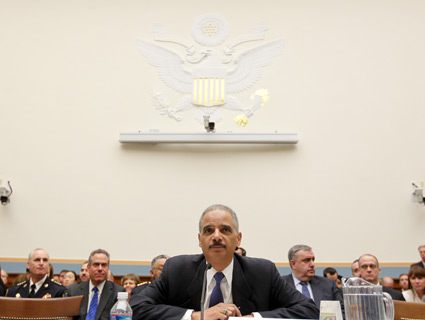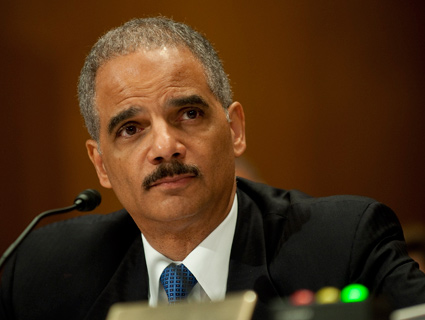
Shh! Top secret.<a href="http://www.flickr.com/photos/38764499@N00/2721122278/">(cup)cake_eater</a>/Flickr
Each year, the National Security Archive at George Washington University announces its Rosemary Award, given to the government agency that is deemed the most abysmal at transparency and “open government performance”—think of it as the RAZZIE Awards, but for FOIA and NatSec nerds.
And the watchdog group’s 2011 Rosemary goes to (drum roll, please…) the Department of Justice, narrowly beating out the Department of Homeland Security, two senior CIA officials, CENTCOM, and the US Agency for International Development.
The Archive’s report lists the following indictments:
- selective and abusive prosecutions using espionage laws against whistleblowers as ostensible “leakers” of classified information, with more “leaks” prosecutions in the last three years than all previous years combined, at a time when expert estimates of over-classification range from 50 to 90%;
- persisting recycled legal arguments for greater secrecy throughout Justice’s litigation posture, including specious arguments before the Supreme Court in 2011 in direct contradiction to President Obama’s “presumption of openness”;
- retrograde proposed regulations that would allow the government to lie in court about the existence of records sought by FOIA requesters, and also prevent elementary and secondary school students – as well as bloggers and new media – from getting fee waivers, while narrowing multiple other FOIA provisions;
- a mixed overall record on freedom of information with some positive signs (overall releases slightly up, roundtable meetings with requesters, the [FOIA website] collating government-wide statistics) outweighed by backsliding in the key indicator of the most discretionary FOIA exemption, (b)(5) for “deliberative process,” cited by Justice to withhold information a whopping 1,500 times in 2011 (up from 1,231 in 2010).
In response to the award, a DOJ spokesperson told Politico that “[a]nyone who knows anything about FOIA will tell you that the Department of Justice is doing more than ever to promote openness and transparency under that Act… [The Archive’s] analysis is really distant from the facts.” As for Obama, the Archive’s report goes pretty easy on POTUS, primarily laying blame for the continued disintegration of transparency on “career officials who seem in practical rebellion against President Obama’s open-government orders.”
“The old rules said that if there was a defensible argument for not disclosing something to the American people, that it should not be disclosed,” the president said on the second day in office. “That era is now over.”
But this week’s report on the Justice Department won’t come as a surprise to anyone familiar with the Obama administration’s pattern in dealing with agency secrets. Since 2009, the self-proclaimed “most transparent administration ever” has routinely echoed Bush-era policy on state secrets, and has led a clampdown on leaks and whistleblowing on an unprecedented scale. (For a monetary frame of reference, in 2010, the cost of the government’s security classification system hit well over $10 billion, a 15 percent increase from 2009, and the first time ever that US secrecy costs surpassed $10 billion.)
Simply blaming the current state of affairs on officials who are allegedly “in practical rebellion” against the president’s wishes seems like a pretty big cop-out.














